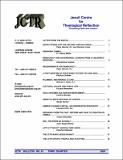| dc.description.abstract | As I stood on a dusty, sunny, and crowded arena in Chikuni Mission, Monze, watching the flamboyant
dance and attires of the Mukanzubo Kalinda Cultural Centre, I couldn’t refrain from thinking about how culture
(traditional and religious) can be a tool to deal with our day to day problems and challenges. This was during
the Radio Chikuni Tonga Musical Concert. I walked around looking for something cold to drink. Though I found
a bottle of water, I settled for an ice-block (flavoured water frozen in a small plastic bag). Sucking on the block, I
wandered about the so many tiny businesses going on. I contrasted these to the nice and comfortable lifestyles
some people in urban areas enjoy and the mega businesses in Lusaka and the Copperbelt.
This experience reminded me of the many events in the third quarter of 2009 that show inequalities, poverty
and lack of enjoyment of human rights in our societies. The question of how well we are dealing with corruption
remains unanswered. Despite verbal commitments, court cases and now the National Anti-corruption Policy,
the fight against corruption remains as illusive as ever. The acquittal of persons accused in corruption charges,
and the “hallelujahs” that follow such acquittals from some “Christian” churches, pose doubts on how serious
Zambia’s anticorruption efforts are. One wonders whether government and others are really serious, especially
when those implicated continue to serve in government.
The assenting to the NGO Bill into law (now an NGO Act) by the President, despite some clearly highlighted
bad clauses in that law, remains a puzzle on the quality of leadership exhibited by both the Legislature and the
Executive. What really made the Legislature to pass the Bill, and what really made the President to sign it into
law? Is it that they did not read carefully the contents of the Bill or the recommendations by NGOs? Or, did they
want to punish the very valid and helpful NGOs? NGOs and partners continue to advocate against the current
NGO Act citing as reasons that the NGO Act (i) could possibly constrict the good work of NGOs because of the
many reporting procedures to Government, and (ii) gives too much power to government institutions to control
NGOs, e.g., the Minister-led NGO board, and registration every five years. | en |

